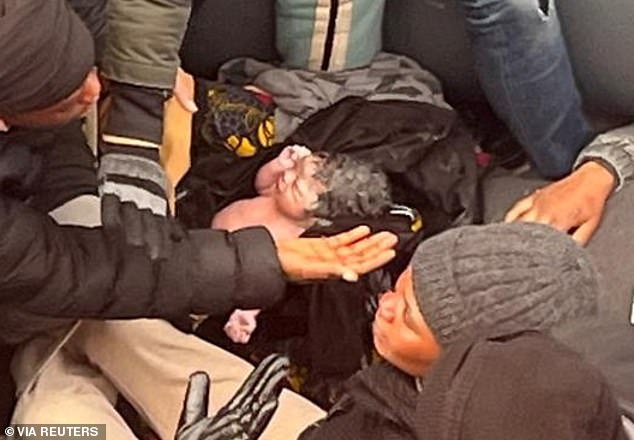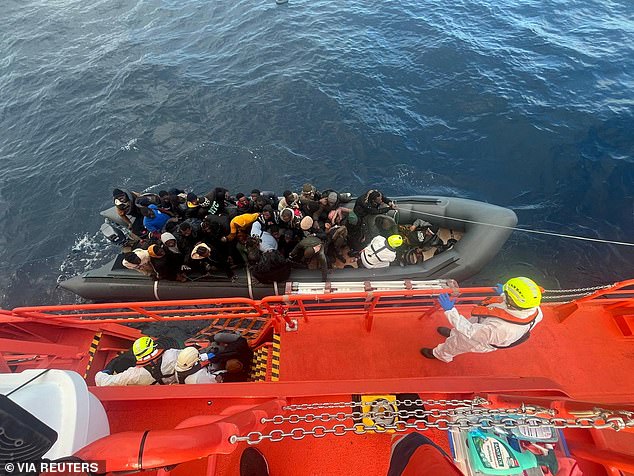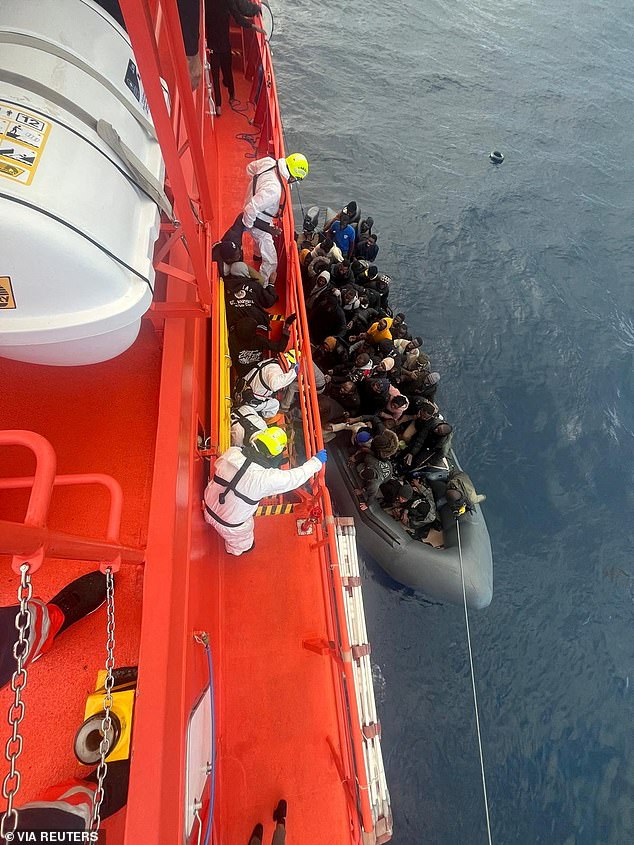Miracle on the high seas: Incredible moment rescuers find newborn on packed migrant boat in Atlantic Ocean, minutes after mother gave birth during treacherous crossing to Canary Islands
This is the incredible moment rescuers found a newborn baby on an overcrowded migrant boat in the Atlantic Ocean after the mother gave birth during the treacherous crossing to the Canary Islands.
An astonishing photo shows a migrant cradling a newborn baby as others on the dinghy move backwards to make room for the baby.
The photo was taken on January 6 when the coastguard boat Talia towed a rubber boat carrying around 64 migrants from the Canary Island of Lanzarote in Spain.
The coastguard shared the incredible moment on social media, writing: ‘Christmas ends in the Canary Islands with the rescue of a baby born during a sea crossing.
‘On Epiphany, the Guardamar Talia rescued a mother who had given birth to her baby on board the inflatable boat in which she was traveling with a large group of people.’
The woman and her baby were taken to a hospital in Arrecife and are said to be in ‘good health’.
“The baby stood out in the middle of everyone, naked, and had been born just ten minutes earlier,” said the captain of the coast guard boat, Domingo Trujillo. Canary Islands7.
On board the dinghy were more than a dozen women and four children, all reportedly of sub-Saharan descent, who made the treacherous journey across the Atlantic Ocean in an attempt to reach the Canary Islands.
An astonishing photo taken from a coastguard boat Talia shows a migrant cradling a newborn baby as others on the dinghy move back to make room for the baby

The woman and her baby were taken to a hospital in Arrecife and the coastguard confirmed they were in ‘good health’

Spanish coastguards, dressed in white suits, work a rescue operation as they tow a rubber boat carrying migrants, including a newborn baby, from the Canary Island of Lanzarote in Spain, in this handout photo obtained on January 8, 2025
The rescue boat was informed around 4 a.m. that there was a pregnant woman in advanced stages of labor who could “give birth at any time” on a dinghy in the Atlantic Ocean, Trujillo said.
He added that the boat was 150 kilometers from Arrecife port and it took the coastguard five hours to get to the dinghy.
When they finally reached the boat, Trujillo was able to see the naked baby, which he said could not have been born until about ten minutes before the Coast Guard arrived.
The captain said: ‘The baby was crying, which told us he was alive and there was no problem, and we asked the woman for permission to clean and bathe him.
‘We placed the baby with her after the umbilical cord had already been cut by one of her fellow travelers.
“All we did was hold the child, give it to the mother and keep it warm for the journey (in the helicopter).”

On board the dinghy were more than a dozen women and four children, all reportedly of sub-Saharan descent, who made the treacherous journey across the Atlantic Ocean in an attempt to reach the Canary Islands.
Surprisingly, this isn’t the first time Trujillo has saved a newborn, but he said that “this time I didn’t have to cut the umbilical cord, not like last time.”
He experienced a similar situation in 2020, when the Salvamar Mizar – a unit he skippered – rescued the occupants of a boat off the coast of Fuerteventura in which a woman had also just given birth, forcing Trujillo to cut the umbilical cord.
“While it is still beautiful and an unforgettable experience, cutting it requires a bit of courage, not just for the sake of cutting, but also for fear of not doing it right,” he said.
“We take this opportunity to express our admiration for Domingo and the rest of the crew who do their best every day to help thousands of people trying to reach the Canary Islands,” the coast guard said in a statement on social media .
This is because, according to Caminando Fronteras, a record number of 10,457 migrants died trying to reach Spain by sea last year.
But the perilous journey has not deterred migrants hoping to reach Spanish land; more than 2,000 arrive between Christmas Day and New Year’s Eve alone.
